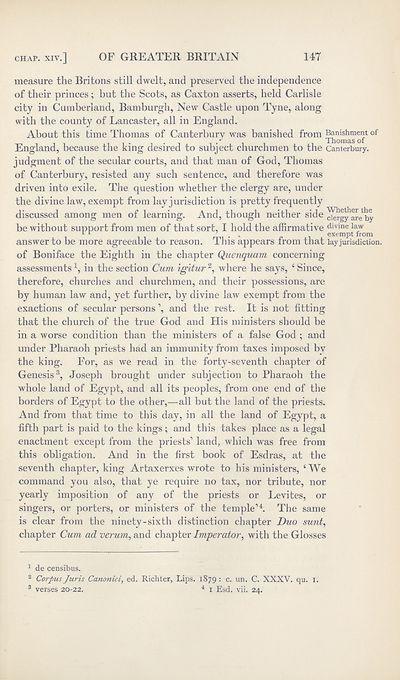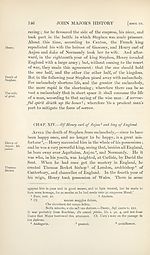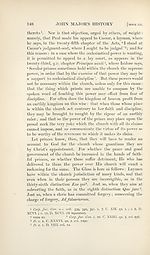Series 1 > History of Greater Britain, as well England as Scotland
(292) Page 147
Download files
Complete book:
Individual page:
Thumbnail gallery: Grid view | List view

147
chap. XIV.] OF GREATER BRITAIN
measure the Britons still dwelt, and preserved the independence
of their princes; but the Scots, as Caxton asserts, held Carlisle
city in Cumberland, Bamburgh, New Castle upon Tyne, along
with the county of Lancaster, all in England.
About this time Thomas of Canterbury was banished from Bani^meni of
England, because the king desired to subject churchmen to the Canterbury,
judgment of the secular courts, and that man of God, Thomas
of Canterbury, resisted any such sentence, and therefore was
driven into exile. The question whether the clergy are, under
the divine law, exempt from lay j urisdiction is pretty frequently
discussed among men of learning. And, though neither side
be without support from men of that sort, I hold the affirmative divine la,w
T 1 1 ’ . . exempt from
answer to be more agreeable to reason. This appears from that lay jurisdiction.
of Boniface the Eighth in the chapter Quenquam concerning
assessments1, in the section Cum igitur 2, where he says, ‘ Since,
therefore, churches and churchmen, and their possessions, are
by human law and, yet further, by divine law exempt from the
exactions of secular persons ’, and the rest. It is not fitting
that the church of the true God and His ministers should be
in a worse condition than the ministers of a false God ; and
under Pharaoh priests had an immunity from taxes imposed by
the king. For, as we read in the forty-seventh chapter of
Genesis3, Joseph brought under subjection to Pharaoh the
whole land of Egypt, and all its peoples, from one end of the
borders of Egypt to the other,—all but the land of the priests.
And from that time to this day, in all the land of Egypt, a
fifth part is paid to the kings; and this takes place as a legal
enactment except from the priests’ land, which was free from
this obligation. And in the first book of Esdras, at the
seventh chapter, king Artaxerxes wrote to his ministers, ‘ We
command you also, that ye require no tax, nor tribute, nor
yearly imposition of any of the priests or Levites, or
singers, or porters, or ministers of the temple’4. The same
is clear from the ninety-sixth distinction chapter Duo sunt,
chapter Cum ad verum, and chapter Imperator, with the Glosses
1 de censibus.
2 Corpus Juris Canonici, ed. Richter, Lips. 1879: c. un. C. XXXV. qu. 1.
3 verses 20-22. 4 1 Esd. vii. 24.
chap. XIV.] OF GREATER BRITAIN
measure the Britons still dwelt, and preserved the independence
of their princes; but the Scots, as Caxton asserts, held Carlisle
city in Cumberland, Bamburgh, New Castle upon Tyne, along
with the county of Lancaster, all in England.
About this time Thomas of Canterbury was banished from Bani^meni of
England, because the king desired to subject churchmen to the Canterbury,
judgment of the secular courts, and that man of God, Thomas
of Canterbury, resisted any such sentence, and therefore was
driven into exile. The question whether the clergy are, under
the divine law, exempt from lay j urisdiction is pretty frequently
discussed among men of learning. And, though neither side
be without support from men of that sort, I hold the affirmative divine la,w
T 1 1 ’ . . exempt from
answer to be more agreeable to reason. This appears from that lay jurisdiction.
of Boniface the Eighth in the chapter Quenquam concerning
assessments1, in the section Cum igitur 2, where he says, ‘ Since,
therefore, churches and churchmen, and their possessions, are
by human law and, yet further, by divine law exempt from the
exactions of secular persons ’, and the rest. It is not fitting
that the church of the true God and His ministers should be
in a worse condition than the ministers of a false God ; and
under Pharaoh priests had an immunity from taxes imposed by
the king. For, as we read in the forty-seventh chapter of
Genesis3, Joseph brought under subjection to Pharaoh the
whole land of Egypt, and all its peoples, from one end of the
borders of Egypt to the other,—all but the land of the priests.
And from that time to this day, in all the land of Egypt, a
fifth part is paid to the kings; and this takes place as a legal
enactment except from the priests’ land, which was free from
this obligation. And in the first book of Esdras, at the
seventh chapter, king Artaxerxes wrote to his ministers, ‘ We
command you also, that ye require no tax, nor tribute, nor
yearly imposition of any of the priests or Levites, or
singers, or porters, or ministers of the temple’4. The same
is clear from the ninety-sixth distinction chapter Duo sunt,
chapter Cum ad verum, and chapter Imperator, with the Glosses
1 de censibus.
2 Corpus Juris Canonici, ed. Richter, Lips. 1879: c. un. C. XXXV. qu. 1.
3 verses 20-22. 4 1 Esd. vii. 24.
Set display mode to:
![]() Universal Viewer |
Universal Viewer | ![]() Mirador |
Large image | Transcription
Mirador |
Large image | Transcription
Images and transcriptions on this page, including medium image downloads, may be used under the Creative Commons Attribution 4.0 International Licence unless otherwise stated. ![]()
| Scottish History Society volumes > Series 1 > History of Greater Britain, as well England as Scotland > (292) Page 147 |
|---|
| Permanent URL | https://digital.nls.uk/127735269 |
|---|
| Attribution and copyright: |
|
|---|
| Description | Over 180 volumes, published by the Scottish History Society, containing original sources on Scotland's history and people. With a wide range of subjects, the books collectively cover all periods from the 12th to 20th centuries, and reflect changing trends in Scottish history. Sources are accompanied by scholarly interpretation, references and bibliographies. Volumes are usually published annually, and more digitised volumes will be added as they become available. |
|---|


